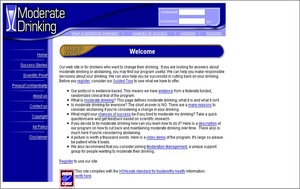Moderate Drinking

- Description:
The Moderate Drinking program is intended to help heavy drinkers to moderate their drinking behaviours using behavioural and cognitive behavioural techniques. These include goal setting, self monitoring, problem solving, personal drinking rules, building motivation and self confidence, identifying and managing triggers and dealing with lapses. When you initially register on the site, the MD program recommends first choosing a goal (abstinence or moderation). Self-monitoring is a central aspect of the program. You are prompted to enter your self-monitoring data each time you log back onto the site and the program provides personalised feedback based on your responses. You can work through the program's modules in order or you can pick and choose which modules might best meet your needs.
- Service URL:
- http://www.moderatedrinking.com
- Agency Responsible:
- Research Division of Behavior Therapy Associates, LLP.
Details
- Format:
- Website.
- Intervention Type:
- Psychological – CBT.
- Course Length:
- Long (more than 5 modules).
- Support Option:
- Automated only.
Target Audience
- Primary Category:
- Alcohol.
- Target Audience:
- Adult.
- Language:
- English.
Access
- Fee:
- Fee-based.
- Access:
- Closed: Fee required.
- Contact Details:
Utilises an online form or email Dr Reid Hester: reidhester@behaviortherapy.com
Research evidence
- Research Trials:
- 1
- Research RCTs:
- 1
- Outcome Summary:
The effectiveness of the Moderate Drinking (MD) program has been investigated in a randomised controlled trial of 80 participants (reported in two papers), which compared MD combined with Moderation Management (MM) (an online mutual help group for drinkers interested in learning how to moderate their drinking) to MM alone. Initial results showed a significant overall reduction in alcohol consumption in both groups. This effect was significant for the percent of days abstinent (d = .52), mean drinks per drinking day (d = .99) and mean estimated blood alcohol concentration (BAC) per drinking day (d = .85). There was also an overall reduction in alcohol related problems (d = .54). The combination of MD and MM results in greater improvements in alcohol consumption. Follow up results at 3, 6, and 12 months indicated a significant overall reduction in both groups in alcohol-related problems and consumption variables. The improvement from baseline to the average at follow-ups was twice as large in the MD+MM group compared to the MM group, but was not significant. The MD+MM group did improve significantly better than the MM group from baseline to 3 months, but not for the later follow-ups. The average between-groups effect size across measures of alcohol related problems and alcohol consumption was moderate (d = .51). The study had an active control group and a number of participants also reported seeking external help during the study period, which may have influenced results. At this stage, there is some evidence in support of the program.
- Recommended rating, reviewer 1:

- Recommended rating, reviewer 2:

Read more about Beacon's Smiley Rating System.
Research paper citations
- Hester, R. K., Delaney, H. D., Campbell, W., & Handmaker, N. (2009). A web application for moderation training: Initial results of a randomized clinical trial. Journal of Substance Abuse Treatment, 37, 266-276.
- Hester, R. K., Delaney, H. D., Campbell, W. (2011). Moderatedrinking.Com and moderation management: Outcomes of a randomized clinical trial with non-dependent problem drinkers. Journal of Consulting and Clinical Psychology, 79(2), 215-224.
User ratings
User ratings and comments are moderated in order to assure the quality of the submissions. It might take a week for your rating to show up.
Your rating
Login to rate this service.
Other user ratings
No ratings for this service yet.
Last Updated: October 25th 2012

 Home
Home
 Categories
Categories Alcohol
Alcohol